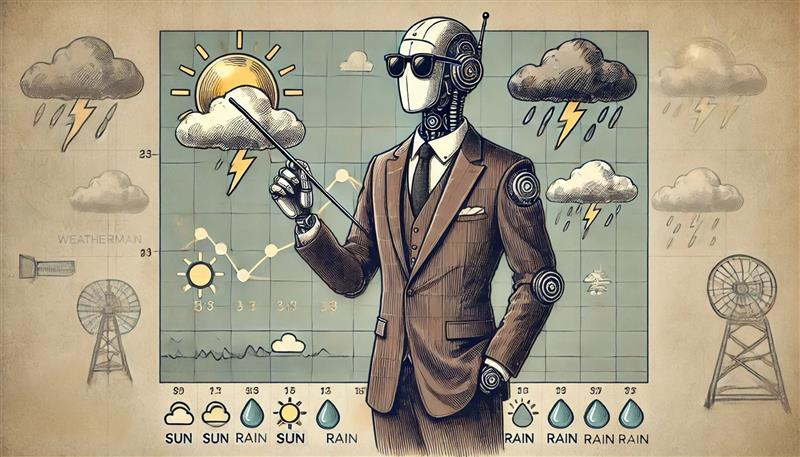This Week in AI: Weather Forecasts Are Getting Smarter
For Dec. 6, 2024: Meta is going nuclear, Google and OpenAI launch competing new AI tools, ChatGPT now has 300 million users, OpenAI offers a premium subscription tier.News

Everyone complains about the weather, and it turns out Google's actually doing something about it.
The tech giant announced an artificial intelligence tool it says is the world's best at predicting the weather as far as 15 days in the future. The tool, called GenCast and made by Google's DeepMind AI development arm, expands on Google's earlier efforts, which had initially been able to predict weather 10 days in the future.
Google's team trained GenCast using massive archives of weather data, dating back nearly half a century. And the technology is apparently so successful that The New York Times reports that at least one European weather forecasting agency has begun adopting some of its features.
The implications of this technology go far beyond accurately predicting if you'll need to carry a light sweater for the night. More accurate weather predictions can lead to better preparation for hurricanes and other natural disasters. It can help farmers manage their crops. And it can help hospitals, cities and schools prepare for the impacts extreme weather can have on vulnerable populations.
Of course, no matter how accurate Google's weather predictions become, I'll probably still pack those extra layers. Just in case.
Meta has nuclear ambitions now
The tech giant behind Facebook, Instagram and WhatsApp said this week it's seeking nuclear energy developers to help meet the massive energy needs it is projecting for AI. The company said it's hoping to fund as much as 4 gigawatts of new nuclear energy capacity in the US, enough to become one of the country's largest energy generating plants (and power up to three time-traveling DeLoreans!)
"Advancing the technologies that will build the future of human connection — including the next wave of AI innovation — requires electric grids to expand and embrace new sources of reliable, clean and renewable energy," Meta wrote in its statement when announcing its investment plans. It's hoping to bring whatever new project online sometime in the 2030s.
With this effort, Meta joins a growing list of tech giants who are investing in nuclear power to offset the massive energy needs AI is expected to demand. Microsoft, Amazon, Google have also announced programs worth an aggregate billions of dollars, including one that will restart a portion of the Three Mile Island nuclear plant in Pennsylvania.
Google and OpenAI compete over AI video
Many people cringed when Coca-Cola published an AI-powered ad, which used the technology to create a remix of its traditional holiday ad campaign. But it's likely to just be the start.
Google this week announced a test release of its Veo AI technology, which can create HD-quality videos in various visual and cinematic styles based on a text prompt. OpenAI, meanwhile, is expected to release a version of its Sora video generating tool, according to a report from The Verge.
AI video technology has come a long way since the Will Smith spaghetti meme days, though much of it still struggles from an uncanny valley-like look.
While the technology is still unproven, some movie makers have said they believe it could help in the production process to experiment with storyboarding and pre-visualizations. In October, Blumhouse Productions, the studio behind thrillers such as "The Purge" and of course the modern-day "Halloween," announced a partnership with Meta to use its AI-video tools.
ChatGPT hits 300 million users, strikes new deal
OpenAI announced its popular ChatGPT service has hit a new milestone of 300 million active users per week, up from 200 million active users per week earlier this year (which itself was double the number from the year prior).
At the same time, the company struck another licensing agreement with a media company, this time with the British publisher Future Plc. It’s the latest in a growing list of partnerships that effectively give legal protections to OpenAI after The New York Times accused the startup of misappropriating copyrighted content to help build its AI tools.
Separately, OpenAI is launching a new high-end subscription tier, called ChatGPT Pro, which will cost $200 a month and include high usage of its newest o1 model...for $200/month. The standard ChatGPT subscription remains at $20/month.
Read more: AI Tools and Tips
- What is Meta AI? A Capable Chatbot That’s 100% Free
- Hands-on with ChatGPT o1-preview, OpenAI's Latest Innovation
- How to Get Started with Copilot for Microsoft 365
- Getting started with LM Studio: A Beginner's Guide
- Meet Claude, the Best AI You've Never Heard of
- How to Get NVIDIA Chat with RTX: Local AI for Everyone
Ian Sherr is a widely published journalist who's covered nearly every major tech company from Apple to Netflix, Facebook, Google, Microsoft, and more for CBS News, The Wall Street Journal, Reuters, and CNET. Aside from writing, he tinkers with tech at home, is a longtime fencer -- the kind with swords -- and began woodworking during the pandemic.












